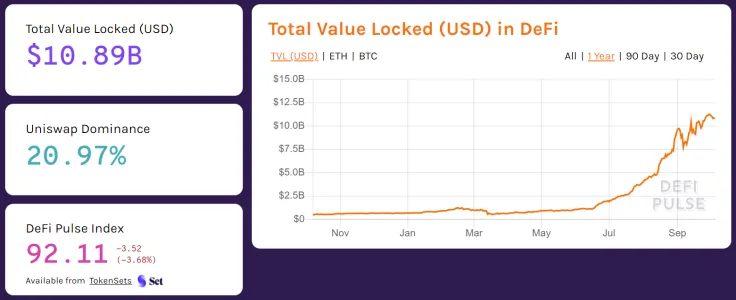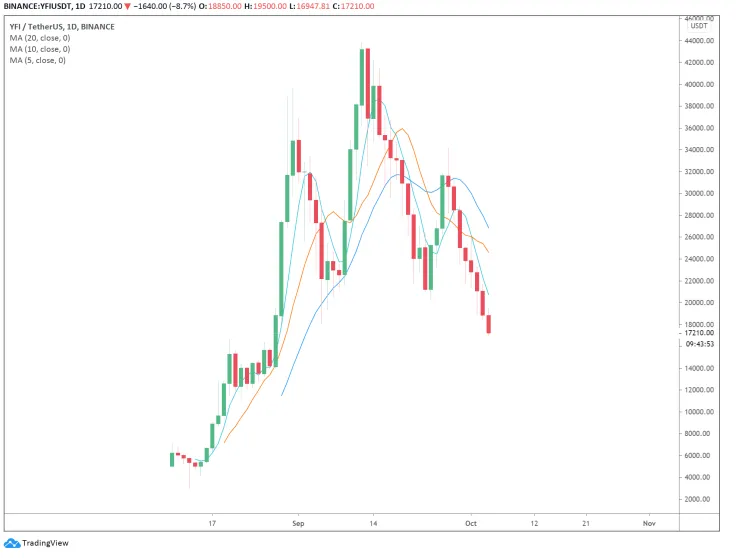
Disclaimer: The opinions expressed by our writers are their own and do not represent the views of U.Today. The financial and market information provided on U.Today is intended for informational purposes only. U.Today is not liable for any financial losses incurred while trading cryptocurrencies. Conduct your own research by contacting financial experts before making any investment decisions. We believe that all content is accurate as of the date of publication, but certain offers mentioned may no longer be available.
Alex Svanevik, the CEO of Ethereum analysis firm Nansen, says decentralized finance (DeFi) would “win” over the long term.
The Ethereum researcher pinpointed one specific catalyst that would propel DeFi over conventional financial services: a low barrier of entry.
Practically anyone who uses Ethereum or other major cryptocurrencies could gain exposure to DeFi services.
Data Shows DeFi is on the Right Track Towards Broader Adoption
DeFi is still a nascent stage, but until early 2020, there were not many users in the DeFi space.
According to Defipulse.com, exactly one year ago, the total value locked in DeFi protocols was $500 million. That means the total sum of money used across DeFi protocols was less than half a billion dollars.
In contrast, the total value locked in DeFi protocols currently hovers at around $10.89 billion. It represents a staggering 1900% increase in just 12 months, showing the explosive growth rate of DeFi.

Based on the exponential growth rate of the DeFi market and the advantage Ethereum-based protocols have, Svanevik emphasized DeFi would win. He said:
“The main reason DeFi will win is that it has the lowest barrier to entry. Fintech companies spend half their time asking for permission from the incumbents. Meanwhile, DeFi teams can innovate.”
Although centralized DeFi (CeFi) work with regulators and seek regulatory guidance from relevant agencies, there are major fully decentralized DeFi projects.
As an example, Yearn.finance (YFI) launched in July in a decentralized manner without premine and a central entity.
Cryptocurrency researchers, led by Daryl Lau, wrote on Deribit’s blog:
“With this, $YFI has had the most favorable supply distribution for a DeFi Community that’s ever been seen with everyone that earned tokens having undertaken the same risks with all the information freely available to them. This fair launch is reminiscent of early Bitcoin mining, as nobody had a head start–not even Andre, and the only way to acquire it was to earn (mine) it.”
Eventually, YFI evolved into a billion-dollar DeFi project and is now valued at around $600 million in market cap.

Innovative DeFi projects, like Yearn.finance, have an edge over traditional fintech platforms. An open-source developer community can simply build the technology, and if the market likes it, it would take off.
The Biggest Concern is Scalability
For DeFi to grow and outpace the fintech space, it would need a scalable and a high-capacity blockchain.
When the recent DeFi cycle hit its peak, platforms like Uniswap became increasingly overwhelmed with user activity. At times, fees per transaction, especially staking or large smart contract transactions surpassed $150 per transaction.
Whether ETH 2.0 or other second-layer scaling solutions could offset the scalability issues Ethereum and DeFi platforms faces remain the key narrative.
 Alex Dovbnya
Alex Dovbnya Arman Shirinyan
Arman Shirinyan Denys Serhiichuk
Denys Serhiichuk